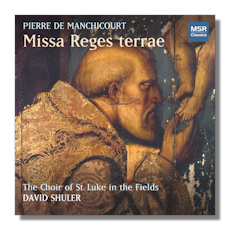
The Internet's Premier Classical Music Source
Related Links
-
Manchicourt Reviews
- Latest Reviews
- More Reviews
-
By Composer
-
Collections
DVD & Blu-ray
Books
Concert Reviews
Articles/Interviews
Software
Audio
Search Amazon
Recommended Links
Site News
 CD Review
CD Review
Pierre de Manchicourt

- Motet "Reges Terrae"
- Mass "Missa Reges Terrae"
- Motet "Caro Mea"
- Motet "Ne Reminiscaris"
- Motet "Vidi Speciosum"
- Motet "Regina Caeli"
The Choir of St. Luke in the Fields/David Shuler
MSR Classics MS1632
Here are spirited, uplifting performances of sacred music by the mid-sixteenth century Franco-Flemish composer, Pierre De Manchicourt (c1510-1564) from The Choir of St. Luke in the Fields (New York) under the organist/director there, David Shuler. As well as the momentum of the accounts, their joie de vivre and sheer brightness of confidence draws you into the musical world of de Manchicourt. He is increasingly recognised as having as valid a place in our esteem as do Clemens non Papa, Crecquillon and Gombert. The approach taken here, where the singers are precise and determined to avoid "effect" or "splendor" for their own sake, adds to the deep satisfaction which this CD affords. It should go some way towards bolstering such recognition for de Manchicourt.
After all, de Manchicourt was one of the most famous composers of his time; many of his works were published in his lifetime. Attaingnant gave over his 14th book of motets exclusively to de Manchicourt. Yet by the turn of the Seventeenth Century his music was all but forgotten as the counter Reformation advanced other musical priorities to support its doctrinal ones. Yes, de Manchicourt has sufficient experience of writing in choirs and sufficient creativity for his music, ultimately, to endure and be a delight for us.
Melodically, de Manchicourt writes with brilliance and originality; though his lines are usually contained and concentrated. Harmonically, the writing lends great satisfaction to our listening… textures too are conventional with a fair spread of registers; but at the same time they necessarily endorse the text: for instance, the preponderance of upper voices in Ne Reminiscaris [tr.8] seems to add to the earnestness of the imprecation; while the sterner balance in the Regina Caeli [tr.10] adds weight and a sense of permanence.
The Choir of St. Luke in the Fields approaches this music aware of, yet determined not to unduly emphasize, nuance in the music of de Manchicourt. They perform as though the momentum, the life and sense of purpose in the music had already placed it at the center of the accepted repertoire. It would have been all too easy to succumb to the temptation of emphasizing the richness of writing, its unwaveringly golden tapestry. Instead the Choir does not let us forget that even the most nourishing stew or soup is made from individual ingredients. Particularities matter; and they are brought to the fore from first to last by Shuler and his forces. The singing, in other words, is accurate and exact.
Not, though, that the performances anywhere lack expressiveness, emotion or humanity. These are gifted individual singers whose commitment is as evident as is their skill. They understand the idiom; but they also bring their own personalities to the performances: their sense of pace and direction makes it a convincing and illuminating collection which is also varied, compelling and approachable. The Mass, "Reges Terrae" [tr.s 2-6] is at the center of the collection together with its source motet [tr.1]. The former is a substantial work at over 37 minutes. And is pleasantly complemented by the other four pieces with Vidi Speciosum [tr.9] providing contrast and an almost impressionistic marriage of text and melodic effect. In this piece we sense de Manchicourt consciously straying outside his immediate remit as a court and church composer to comment on – to paint – the secular world.
The acoustic on the CD (recorded in February and March last year, 2016) is clean and resonant. There is space and room for the music to breath. At the same time, every syllable is audible, the relative ranks of the singers's registers suggest something not so much (merely, or spuriously) forceful as justifiably alive and immediate. The dozen-strong choir leans metaphorically forward, not because instructed to do so, but because the music spontaneously elicits engagement and an open channel of communication with its listeners. There is not, though, any awkward informality. Rather, the choir as individuals gently "glow" with a sense of commitment and certainty – conviction, even – that this is music of the highest order.
The 16-page booklet that comes with the CD concentrates on exploring the ways in which each of these six beautiful works (each but the Mass lasts under seven minutes) may best be seen in the context of de Manchicourt's brief life. There are three other worthy recordings of Reges Terrae and the Mass based upon it (of the motet from the Huelgas Ensemble on Sony Classical Vivarte 62694; and of the Mass by Nordic Voices on Chandos 5050, The Sixteen, Coro 16037); and of the Regina Caeli by Peter Phillips's Musica Reservata de Barcelona (La Ma De Guido 2092). But this collection from MSR Classics can be safely recommended not only for providing a plain yet convincing insight into a composer who deserves to be better known, but also for doing so with élan and an unadorned sense that his music needs no apologies. Recommended.
Copyright © 2017, Mark Sealey



















